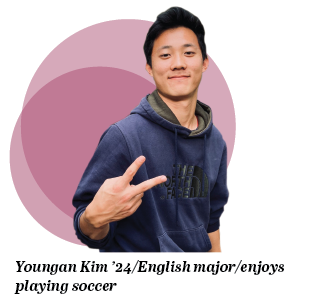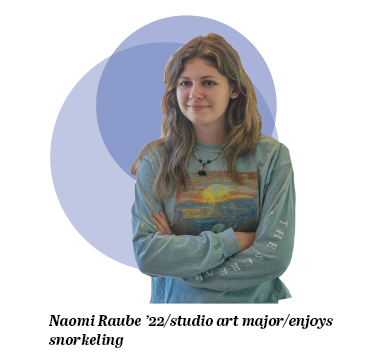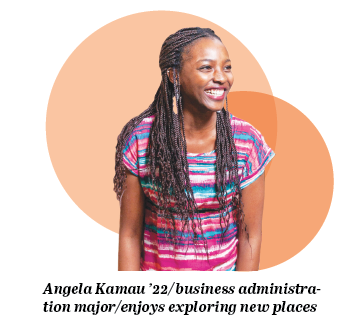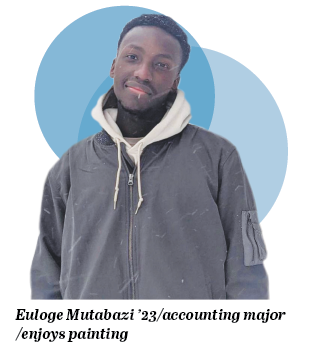“My passport says I am Korean, but Korea does not feel like home to me because I’ve never lived in Korea for more than three months at a time. And while I grew up as a child of missionaries in Azerbaijan, the most meaningful parts of my life were spent in Germany. Yet, I don’t feel German because my time in Germany was mostly on a boarding school campus, so I had limited exposure to German culture. That campus really felt like home, but so did Azerbaijan—even though I don’t look anything like the people in either one of those countries. I just like to say that I’m a child of God.”
Youngan’s understanding of “home” (as explained above in his own words) resonates with what many children of missionaries have experienced over the decades. Earlier generations referred to individuals like Youngan (a sophomore English major at Cairn) as Missionary Kids (MK), but the current term is Third Culture Kids (TCK). TCKs are individuals who grow up in a culture other than their parents’ or the culture of their country of nationality and who live in a different environment during a significant part of their child development years[1]. Some of them were born in the US before spending parts of their formative years living in a different culture, while others have come to the US for their studies as international students. These students represent a segment of the campus population that has grown at the University over the past five years. They each have a unique set of needs that the University aims to support.
I spent four years as a TCK at the University in the early 90s. Nearly 30 years later, I find myself as the director of Campus Services, a role from which I’ve been able to watch the evolution of TCKs and their needs. Of the TCKs currently enrolled at Cairn, approximately half hold non-US passports—a testament to the growth of the global church. In the current generation, other countries are actively sending nationals to foreign countries as missionaries, something that was less common a generation ago when I was a TCK.
My generation of TCKs largely represented families with US passports who went abroad to serve in other cultures. Coming back for college, the transition of languages and cultures (layered on top of the challenges that most every student faces when heading off to college) only added to the complexities of navigating my place on a new campus in a new country. To ease that transition, the University hosted a weeklong MK reentry retreat that greatly helped my own understanding of some of the emotions I would feel, the cultural challenges I would face, and the differences I would encounter in interpersonal relationships.
Though my family made every effort to assist me, my first year on campus was one of the most trying times of my life; the struggles of that year are still very vivid. Seeing the current generation navigate similar challenges with less parental support than what benefited me is discouraging. The current generation may have more to contend with than I did 30 years ago, and the support networks and mechanisms do not appear to have kept pace with the increasing complexities faced by current TCKs.

For example, Sierra, like many TCK students, arrived in Langhorne four years ago without the benefit of a transition seminar. This left her largely on her own to navigate the many complex layers of personal identity she may not even have been aware of as she attempted to settle into a new school, culture, and country.
By the time Sierra walked onto campus for the first time, she had been in the United States for three weeks. In her mind, she was Nicaraguan, having lived most of her life there with her American parents who served as missionaries. She carried to campus a fear of losing the identity she found in her country—fears of betraying her Nicaragua.
Doing her best to assimilate into her new communities, she felt inadequately prepared to be an adult in the US, her birth country. Day-to-day living was exponentially more complicated by having to make decisions, a process that easily overwhelmed and attacked her self-confidence in the ability to live fully and happily.

When Youngan arrived in Langhorne, it was his first time in the US, and he arrived with high excitement. He expected to enter a US life like he had seen portrayed on TV. What he found was that TV does not always resemble reality. He also assumed he would adjust quickly, but that turned out not to
be the case. In hindsight, he recognizes that assimilating into Black Forest Academy was easy because everyone had some sort of international experience. They already understood him because they lived abroad. Relationships formed so quickly—too easily. He did not have to break any barriers to get to know people there. He now recognizes that many of his peers at Cairn do not come from an international background, which makes building new relationships for Youngan more challenging.
The first people he met at Cairn were not international. He arrived on campus two weeks before the semester began and met his teammates on the soccer team, none of whom were TCKs (several other international students were unable to get to Langhorne due to COVID visa complications). He expected relationships to grow quickly and deeply, similar to how his relationships with other TCKs had grown in Germany. As the semester progressed, he realized that extended time is important for things to grow deep in US culture. Everything felt shallow, which was discouraging, and he thought he was doing something wrong. This is a common experience for TCKs; they are prone to take new relationships to a deeper level than what is common in the US culture. Due to the transient nature of their upbringings, TCKs form relationships in this manner because they are
accustomed to friends having to leave; in other words, build a deep friendship quickly before you miss the opportunity.
Just as Youngan experienced, this made his transition rough for the first months. In his view, the American students were more in their comfort zone because they were in their native culture. They already knew how to approach people and make friendships. For them, the transition was just “going away to college,” leaving their parents, perhaps in a different part of the country. Those were elements Youngan had to adapt to as well, but in addition to that, he was adapting to a new culture, trying to understand how to figure out things like forming relationships. All of this made the transition extreme. There are similar echoes in the stories of other TCK students, like Naomi.

By the time Naomi arrived on campus, she was sleep deprived from traveling around the globe. Having lived most of her life in Papua New Guinea, she weighed her options as to what to do after high school. That decision included the big step of leaving behind the remote village lifestyle and country of her childhood. She decided to attend the University because it was less intimidating to go to college than it was to figure out the many unknowns of learning how to find a job and live in a brand new country. University would provide a structure, with room and board needs already cared for—needs that were much more intimidating to figure out on her own.
As she prepared to travel to the US for university, she spent her last week at her closest friend’s house in a remote village with no electricity and no running water. That was followed by a week in Japan and a week in Oregon before Naomi found herself in Langhorne. She arrived at Cairn overwhelmed by the pace of life in the US, which seemed to go at lightning speed when compared to what she experienced only three weeks prior.

International students navigate similar cultural adjustments to those in Naomi’s experience. The path some international students take involves leaving their country and seeing an airplane for the first time. That was not the case for Angela, who spent some years in the US as a child when her father attended seminary. When she arrived on campus to start university, she already knew a bit about US culture, but she struggled with the logistical hurdles of getting college-ready. Her plan to attend the University was dependent on working each semester, but there was no guide for how she was to obtain the necessary permits, paperwork, and authorization. These questions came at the same time she began to think about her identity in terms of her culture and nationality. Though Angela attended an international high school in Nairobi, she had never faced being in the minority until she was on Cairn’s campus. For the first time in her life, she thought of herself as Kenyan.
In jumping over these logistical hurdles, navigating culture shock, and defining her cultural identity, she struggled to find her footing. Langhorne and the University were so different from anything she had experienced before, and being independent in a strange place was difficult.

For Euloge, coming to Langhorne from Burundi in January required immediate adjustments: acclimating to the cold temperatures, assimilating into friendships that had already formed during the fall semester, and trying to navigate it all in an English-speaking world. It was so overwhelming that he turned into a quiet and shy personality for the first 18 months of his time on campus. People would not recognize the Euloge of his first days on campus compared to the outgoing and jovial Euloge of today. The change was largely due to his lack of confidence with speaking and understanding the English language and US culture.
Thankfully, Cairn recognizes the paths that Sierra, Youngan, Naomi, Angela, and Euloge traveled as they embarked on their University journeys are all too common. A team is now dedicated to serving the needs of students who come to campus with an overseas experience.
Along with several staff and faculty, Admissions Counselor Carrie Brown and Carolyn and Guy Eshelman, the University’s missionaries in residence are dedicated to this ministry. As the admissions counselor responsible for the admission of international students and TCKs, Carrie is often one of the first Cairn people that these prospective students meet. She guides them through the steps of getting to campus and getting their college career off to a good start. Carrie then introduces incoming students to the Eshelmans.
After serving for many years as missionaries in Albania, Guy and Carolyn arrived in Langhorne three years ago. Since that time, they have established an orientation for incoming students from overseas backgrounds. This orientation time is practical—attending to their needs of ordering textbooks, shopping for dorm room essentials that do not fit in a suitcase, establishing US-based bank accounts, time zone adjustment, and applying for work permits—but it is also a time set aside for TCK and international students to begin connecting with one another. The Eshelmans also walk them through some of the things they may encounter as they process trying to establish new relationships with students raised in the US culture. The Youngans, Angelas, Sierras, Euloges and Naomis of incoming classes now have the benefit of this team dedicated to helping them navigate logistics, the complexities of transition, and awareness of the cultural challenges.
The challenges international and TCK students face have only become more complex as our world has changed, but the support the University provides affords a smoother ride. With a new academic year underway, tackling the transition as a group with the Eshelmans’ guidance is helping students who have recently arrived in Langhorne feel more prepared for what’s next.
Andy Norton ’94/G’20 is the director of Campus Services at Cairn. He can be reached at anorton@cairn.edu
1. David C. Pollock and Ruth E. Van Reken, Third Culture Kids: The Experience of Growing Up Among Worlds, (Boston: Nicholas Brealey Publishing, 2001).